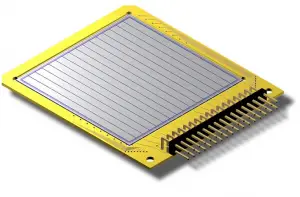
Silicon-based semiconductor detectors are mainly used for charged particle detectors (especially for tracking charged particles) and soft X-ray detectors while germanium is widely used for gamma ray spectroscopy. A large, clean and almost perfect semiconductor is ideal as a counter for radioactivity. However, it is difficult to make large crystals with sufficient purity. The semiconductor detectors have, therefore, low efficiency, but they do give a very precise measure of the energy. Detectors based on silicon have sufficiently low noise even by room temperature. This is caused by the large band gap of silicon (Egap= 1.12 eV), which allows us to operate the detector at room temperature, but cooling is prefered to reduce noise.
Advantages and Disadvantages of Silicon Detectors
Advantages of Silicon Detectors
- Compared with gaseous ionization detectors, the density of a semiconductor detector is very high, and charged particles of high energy can give off their energy in a semiconductor of relatively small dimensions.
- Silicon has a high density of 2.329 g/cm3 and therefore the average energy loss per unit of length allows building thin detectors (e.g. 300 µm) that still produce measurable signals. For example, in case of minimum ionizing particle (MIP) the energy loss is 390 eV/µm. The silicon detectors are mechanically rigid and therefore no special supporting structures are needed.
- Silicon-based detectors are very good for tracking charged particles, they constitute a substantial part of detection system at the LHC in CERN.
- Silicon detectors can be used in strong magnetic fields.
Disadvantages of Silicon Detectors
- Price. The disadvantage is that silicon detectors are much more expensive than cloud chambers or wire chambers.
- Degradation. They also suffer degradation over time from radiation, however this can be greatly reduced thanks to the Lazarus effect.
- High FWHM. In gamma spectroscopy, germanium is preferred due to its atomic number being much higher than silicon and which increases the probability of gamma ray interaction. Moreover, germanium has lower average energy necessary to create an electron-hole pair, which is 3.6 eV for silicon and 2.9 eV for germanium. This also provides the latter a better resolution in energy.
We hope, this article, Advantage and Disadvantage of Silicon Detectors, helps you. If so, give us a like in the sidebar. Main purpose of this website is to help the public to learn some interesting and important information about radiation and dosimeters.